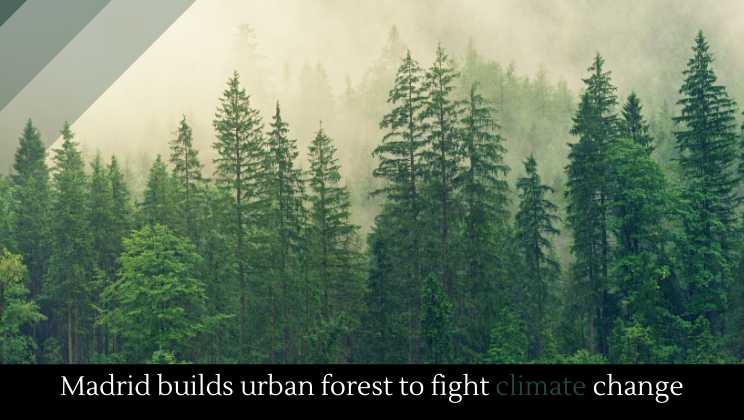Madrid builds urban forest to fight climate change
Posted by Thomas Bush / July 20, 2021
Angela Merkel has called for climate change action after floods killed scores of people in Germany. Experts agree with her: these floods are the result of climate change, and the time to act is right now. Madrid, Spain is doing its part by building a huge forest around the city. The hope is that the wall will prevent the “heat island” effect that often plagues cities, as well as to mitigate the greenhouse gases common in urban areas.
Greenland’s government has halted oil exploration of the island’s coast, saying the move was a “natural step” because it “takes the climate crisis seriously.” According to a recent study, extreme heat and cold is killing 5 million people a year, and the number is rising as temperatures get more extreme. The United States has just experienced the hottest June in the 127 years since record keeping began. Even though it’s early, the West has been experiencing a tremendously hot summer.
More than a billion animals living on the British Colombia seashore may have died during the last heatwave. Animals like mussels, clams, sea stars, and others died en masse along the shore, leading to a horrible smell and a ravaged ecosystem.
Canadians on the west side of the country had to ditch the usual light sweaters for bathing suits as temperatures soared this week to nearly 116º, shattering heat records for the region. So far, at least 230 people have died from the heat and a thousand people had to be evacuated from a town as a wildfire raged. Fire clouds in the region led to over 700,000 lightning strikes, a highly unusual event in Canada.
Earlier this month, NASA and NOAA said the Earth is now trapping an unprecedented amount of heat, which is contributing to rapidly warming air, water, and land. That helps to explain the heatwave heading to the American West, and some 200 million people are expected to suffer through 90º weather––another 40 million will be sweating through 100º+ weather. Although there has been progress towards addressing climate change (see below), this is a reminder that we are still in––forgive the pun––hot water. The spiking temperatures are likely to bring a dubious honor to the United States: World’s Hottest Place. Nevada had already set a record for high temperatures for this time of year.
The Keystone XL pipeline has been canceled. The nixing of the project has led climate change activists to rejoice, and honestly we should all rejoice with them. If they are right, and the age of fossil fuels is ending, it can’t end quickly enough. The National Oceanic and Atmospheric Administration has said that the levels of carbon dioxide in the air are now 50% higher than the preindustrial period.
Researchers found that arctic ice is thinning twice as fast as they originally anticipated. Climate scientists have warned that the world has a 40% chance of being hotter than pre-Industrial Revolution temperatures, which is the lower of the two temperature limits set by the Paris Agreement. The odds of that happening sooner rather than later seem good, since China’s construction boom has generated something like 12 billion metric tons of CO2. Nevertheless, the United States and China have agreed to move forward with climate change, despite the rising tensions over Taiwan and the Philippines.
The Arctic Circle reached a shocking 100.4ºF this year, a temperature scientists didn’t expect to see until the year 2100. If that temperature is verified, it will be the hottest ever recorded.
Climate change is killing people––literally. Scientists in Australia estimate that some 2% of deaths between 2006-2017 resulted from excessive heat. Without accounting for climate-related deaths as they happen, it will be impossible to keep track of the damage or understand exactly how climate change is affecting people.
Just look at the fires from Australia as the year ends: the country was literally burning to the ground. The images that came out of the country depict “armageddon.” An estimated 500 million animals have been killed in the fires. The fires are so bad they’re creating their own weather. Thousands of Australians were trapped on beaches trying to escape the fires, which are neared Melbourne suburbs. Elsewhere, in villages in the state of Victoria, citizens were warned that it’s too late to escape, and they must stay inside.
The Seattle Times suggests that climate change should be our nation’s biggest priority. The Guardian says the same thing, that it’s time for politicians to make stark choices.
More news.
Comments are off for this post.